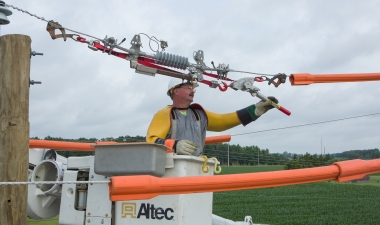Delaware Electric Cooperative
Beat the Peak
Since 2008, DEC’s Beat the Peak program has saved members over $38 million! Learn how you can start participating in Beat the Peak today!
During times when the cost to purchase and produce power for members is high, we issue Beat the Peak alerts where we ask members to conserve energy. The money saved is passed on to our members in the form of affordable rates.

3 Ways to Participate
Energy Saving Tips

Lower my Energy Use
Complete your energy profile for money saving tips, bill analysis, your energy forecast and more.

Beat the Peak with EVs
Charge your EV during off-peak times to keep energy costs affordable.

Home Energy Audits
Make your home more energy-efficient and receive significant discounts.

Community Solar
Learn how to power your home with renewable energy without the hassle of a costly system.
Start or Transfer Service
We are committed to providing safe, reliable and competitively priced energy services and empowering our members to improve their quality of life. Join the Delaware Electric Co-op family and let us help you start or transfer your service.

Recent News
Read All Recent News-
 Read More About Spice Up Your Next Meal with Cowboy Caviar
Read More About Spice Up Your Next Meal with Cowboy CaviarSpice Up Your Next Meal with Cowboy Caviar
Ingredients 1 can (15 ounces) sweet corn 1 can (15 ounces) black beans 1 bunch cilantro 3 Roma tomatoes 2 jalapeno peppers 1/2 red onion -
 Read More About Check Out Your Electric Bill’s New Look This Month
Read More About Check Out Your Electric Bill’s New Look This MonthCheck Out Your Electric Bill’s New Look This Month
Your electric bill is getting a revamp! Starting in May, DEC is implementing several changes to your monthly billing statement. One of the -
 Read More About Your Voice Matters: DEC’s Board Election
Read More About Your Voice Matters: DEC’s Board ElectionYour Voice Matters: DEC’s Board Election
Our Cooperative’s strength is found in our business model, which provides for democratic control of DEC. Our board of directors is elected -
 Read More About Full Details on DEC’s 2024 Annual Meeting
Read More About Full Details on DEC’s 2024 Annual MeetingFull Details on DEC’s 2024 Annual Meeting
Delaware Electric Cooperative is excited to welcome members to our in-person 2024 annual meeting! All the fun will take place at the -
 Read More About Vegetation Management Keeps DEC Employees Safe!
Read More About Vegetation Management Keeps DEC Employees Safe!Vegetation Management Keeps DEC Employees Safe!
As a DEC member, you have the opportunity to help the Co-op provide reliable power to the people and places we serve, while keeping




